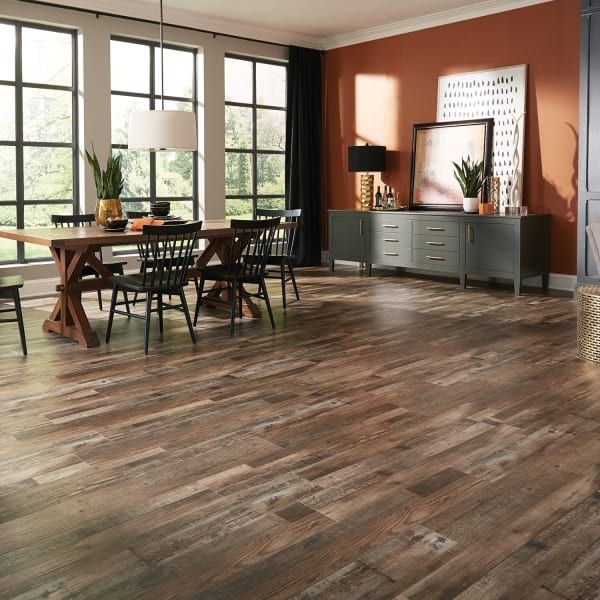

It can handle stains and scratches that would damage other styles of flooring in seconds and is ideal in areas where moisture can be a problem.

Vinyl is a unique material in more ways than one. What type of vinyl floor will you install? In this guide, we’re going to discuss the best underlayment for vinyl flooring based on your budget and floor style. Wear layers and topcoats can protect the surface of your floor, but underlay adds a layer of protection to the bottom of your boards or tiles. With certain types of flooring, the underlayment can be just as important as the floor itself. While vinyl flooring is known for its resiliency, it would be a major mistake to overlook the underlayment. It’s easy to overlook little things when considering shades or finishing techniques, especially if you plan on handling the installation yourself. Laminate Vinyl Floor carries a wide variety of both WPC and SPC waterproof vinyl flooring in styles that range from hardwood to natural stone looks.Choosing new flooring for your home can be exciting, but also stressful. Do some research, consider where and how it will be used in your home, and pick the best product for your needs and budget. However, as with any flooring, do not make your selection on pricing alone. Price - In general, SPC vinyl flooring is less expensive than WPC. Because of SPC's stone core, it is less susceptible to expansion and contraction that occurs with flooring in climates that experience extreme temperatures. Stability - If we didn't live in South Florida, temperature stability would be another consideration. The additional thickness also gives WPC a slight advantage in terms of comfort when walking on it, sound insulation, and temperature regulation.ĭurability - Because SPC core is made of stone, it is denser and slightly more durable when it comes to everyday traffic, major impacts, and heavy furniture. Thickness - WPC floors tend to have a thicker core and overall plank thickness (5.5mm to 8mm), versus SPC (3.2mm to 7mm). While WPC and SPC share many similarities, there are a few differences to point out that can help you better select the right flooring option for your home.
#WATERPROOF VINYL FLOORING WITH PADDING INSTALL#
For even more durability, choose a flooring with a thicker wear layer.Įasy to Install - DIY installation is an option for handy homeowners as the flooring is easy to cut and simply snaps together over virtually any type of subfloor. They are scratch and stain resistant and work well in high traffic areas. Waterproof - Because both WPC and SPC vinyl flooring are completely waterproof, you can use them in places where you normally couldn't use hardwood, such as bathrooms, kitchens, laundry rooms, and basements (outside of South Florida).ĭurable - Both WPC and SPC flooring are incredibly durable and long-lasting. WPC and SPC come in a variety of styles to mimic natural stone, hardwood, and even exotic tropical hardwoods.Ĭore layer - The rigid core layer is what makes this floor waterproof, and is either composed of wood and plastic (WPC) or stone and plastic (SPC).īase layer - The bottom layer is either cork or EVA foam. Vinyl layer - The vinyl layer is where the design is printed. Wear layer - This is a thin, transparent layer that protects the flooring against scratches and stains. In SPC, the core is made of natural limestone powder, polyvinyl chloride, and stabilizers.īoth types of rigid core floors are made up of 4 layers: In WPC, the core is made of natural recycled wood pulp fibers and a plastic composite material. What makes these floors waterproof is their rigid cores. You might also hear waterproof vinyl flooring called enhanced vinyl plank, rigid vinyl plank, or engineered luxury vinyl flooring. When shopping for waterproof vinyl flooring, you may encounter several terms and acronyms. One of today's most popular flooring materials is waterproof vinyl flooring not the stuff sold on rolls, but incredibly long-lasting, durable, comfortable, and waterproof luxury vinyl tiles and planks that come in virtually every style imaginable. Outside of real hardwood and natural stone flooring, you will find a vast selection of engineered flooring options.


 0 kommentar(er)
0 kommentar(er)
